Vaccines can sometimes leave kittens feeling lethargic and tired after receiving their shots. This is a normal reaction as the vaccines stimulate their immune system to release antibodies that help fight off potential diseases. The mild fever, upset stomach, soreness, and cold-like symptoms that kittens experience after vaccinations can make them feel exhausted and less active. However, it is important to understand the reasons behind this lethargy and know how to make your kitten feel better after getting shots.
Key Takeaways:
- Post-vaccination lethargy in kittens is a normal reaction to the vaccines stimulating their immune system.
- Kittens may experience symptoms such as mild fever, upset stomach, soreness, and cold-like symptoms after vaccinations, leading to lethargy.
- Providing a quiet resting place, offering plenty of fluids, monitoring appetite, and avoiding excessive play can help your kitten feel better after shots.
- Severe reactions to vaccines are rare but require immediate veterinary attention. Watch out for symptoms such as difficulty breathing, facial swelling, and vomiting.
- Vaccinations are crucial for protecting your kitten from serious and contagious diseases, despite the potential for minor side effects.
Reasons Why Vaccines Make Kittens Feel Tired
After receiving vaccines, kittens may exhibit symptoms of lethargy. This is a normal reaction to the vaccination process and is caused by the immune system’s response. When the vaccines are administered, they stimulate the immune system to release antibodies to protect against specific infectious organisms. This immune response requires the body to use more energy, which can lead to tiredness and sleepiness in kittens.
The lethargy experienced by kittens after vaccinations is generally more pronounced in those receiving their first doses. It is also important to note that the duration of lethargy can vary, but it typically lasts for about a day or two. It is essential to understand that this tiredness is a normal reaction and not a cause for concern.
Symptoms of Lethargy in Kittens After Vaccinations:
- Excessive sleepiness
- Reduced activity levels
- Loss of appetite
- General lack of energy
These symptoms are temporary and should resolve on their own. However, if the lethargy persists or worsens, it is advisable to consult a veterinarian for further evaluation and advice.
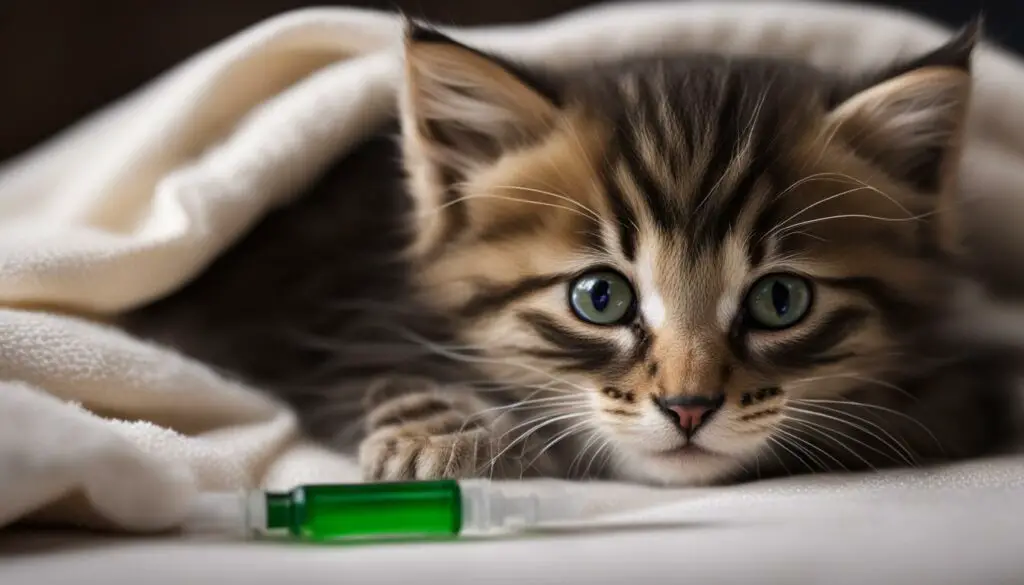
It is important to provide a comfortable and quiet space for your kitten to rest after vaccinations. Avoid excessive play or strenuous activity that may exacerbate any soreness at the injection site. Monitor your kitten’s appetite and ensure they have access to fresh water to prevent dehydration. By following these steps, you can help your kitten recover from the tiredness associated with vaccinations and support their overall well-being.
Side Effects of Cat Vaccines
While vaccinations are crucial for protecting your kitten from harmful diseases, it is important to be aware of the potential side effects that vaccines can cause. Most side effects are mild and transient, resolving on their own within a short period of time. However, it is essential to monitor your kitten closely after vaccination to ensure their well-being.
Common side effects of cat vaccines include:
- Sleepiness
- Mild stomach upset
- Localized swelling at the injection site
- Cold-like symptoms such as runny nose and coughing
These symptoms are typically mild and should not cause significant concern. However, in rare cases, severe allergic reactions can occur. It is important to watch for signs of anaphylaxis, which may include difficulty breathing, vomiting, excessive drooling, or diarrhea. If any of these symptoms are observed, immediate veterinary care should be sought.
Table: Common Side Effects of Cat Vaccines
| Side Effect | Description |
|---|---|
| Sleepiness | Increased tiredness and lethargy |
| Mild stomach upset | Temporary digestive discomfort |
| Localized swelling at the injection site | Small bump or redness at the site of vaccination |
| Cold-like symptoms | Runny nose, sneezing, and coughing |
Even though side effects can occur, it is important to remember that the benefits of vaccination far outweigh the risks. Vaccines protect your kitten from life-threatening diseases, ensuring their long-term health and well-being. If you have any concerns about the side effects of vaccines, it is always recommended to consult with your veterinarian for personalized advice and guidance.
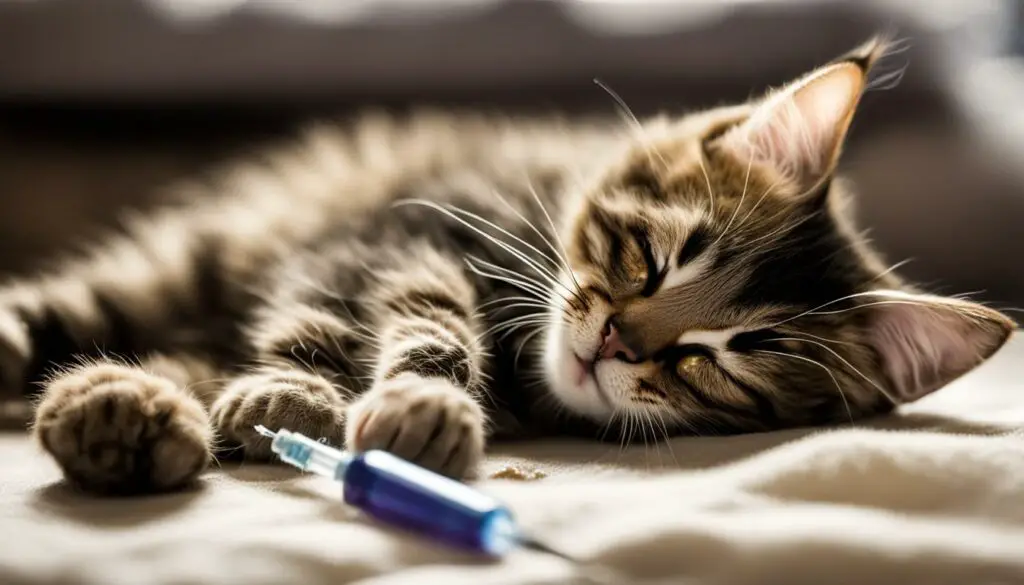
Ways to Make Your Kitten Feel Better After Getting Shots
After your kitten receives vaccinations, it is common for them to feel a bit lethargic and tired. Luckily, there are several tips and tricks you can use to help your furry friend feel better and get back to their normal energetic self.
Elevate Comfort and Rest:
Creating a quiet and comfortable space for your kitten to rest is essential. Provide a cozy bed or a warm blanket in a secluded area away from loud noises and disruptions. This will allow your kitten to relax and recover without additional stress.
Monitor Hydration and Appetite:
Offer your kitten fresh water and keep an eye on their hydration levels. Dehydration can worsen lethargy, so ensuring they have access to water at all times is crucial. Additionally, monitor their appetite and encourage them to eat small, easily digestible meals to prevent any upset stomach.
Avoid Excessive Activity:
While your kitten may want to play and explore, it’s important to avoid any strenuous activity that could worsen any soreness or discomfort at the injection site. Give them some time to rest and recover before engaging in any vigorous play or exercise.
Check their Temperature:
Monitoring your kitten’s temperature can provide valuable insight into their overall health. If their temperature exceeds 103 degrees Fahrenheit, it’s important to contact your veterinarian for further guidance and evaluation.
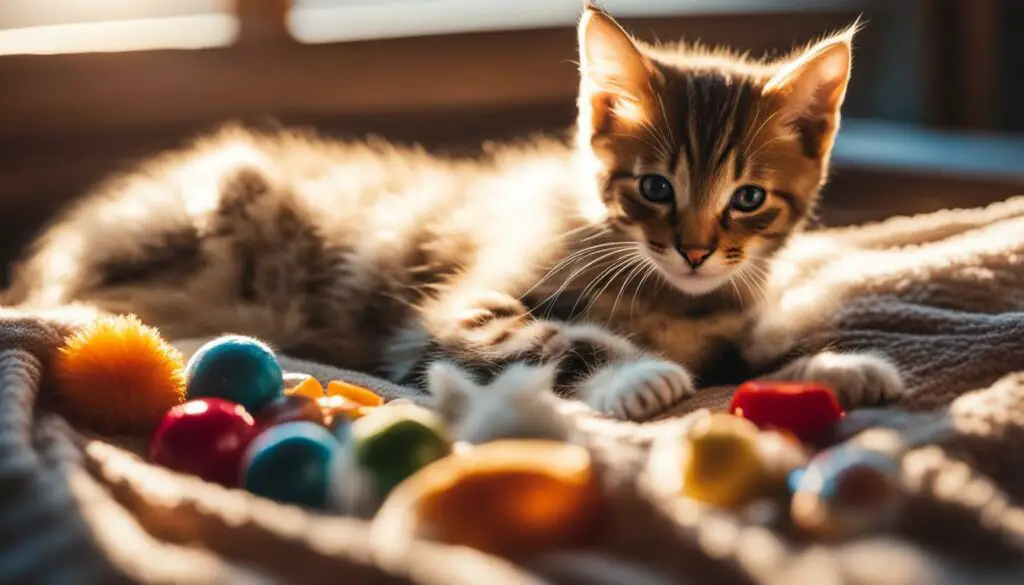
| Tips to Help a Lethargic Kitten After Shots: |
|---|
| Elevate comfort and rest: |
| Provide a quiet and comfortable space for your kitten to rest and recover. |
| Monitor hydration and appetite: |
| Ensure your kitten has access to fresh water and monitor their appetite to prevent dehydration and upset stomach. |
| Avoid excessive activity: |
| Give your kitten time to rest and avoid any activities that may worsen soreness or discomfort at the injection site. |
| Check their temperature: |
| Monitor your kitten’s temperature and consult your veterinarian if it exceeds 103 degrees Fahrenheit. |
How Can I Prevent My Kitten From Having an Allergic Reaction to Vaccines?
Preventing allergic reactions to vaccines in kittens is crucial for their safety and well-being. Here are some measures you can take to minimize the risk:
- Inform your veterinarian about any previous vaccine reactions your kitten has experienced. This will help them determine the best approach for future vaccinations.
- Consider spacing out and separating vaccines. By administering them at different times or even weeks apart, you can reduce the likelihood of a severe allergic reaction.
- Discuss with your veterinarian the possibility of temporarily skipping certain vaccines based on your kitten’s health condition and risk factors.
- Administering medications such as Benadryl before vaccinations may help prevent or reduce allergic reactions. However, always consult your veterinarian for the appropriate dosage and instructions.
- If your kitten has a history of severe vaccine reactions, your veterinarian might recommend monitoring them in the veterinary hospital after vaccinations to ensure prompt medical attention in case of an emergency.
Remember, it is essential to work closely with your veterinarian to develop an individualized vaccination plan that prioritizes your kitten’s safety while still providing necessary protection against diseases.
“Preventing allergic reactions to vaccines in kittens is crucial for their safety and well-being.”
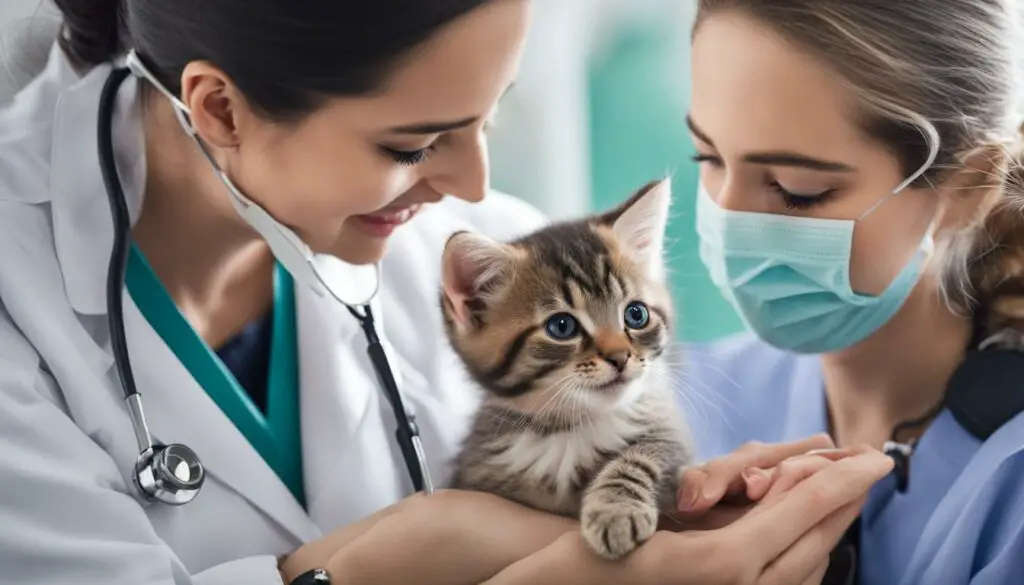
| Prevention Measures | Benefits |
|---|---|
| Informing your veterinarian about previous vaccine reactions | Allows for appropriate vaccination protocol adjustments |
| Spacing out and separating vaccines | Reduces the risk of severe allergic reactions |
| Discussing the temporary skipping of certain vaccines | Tailors vaccination plan to your kitten’s specific needs |
| Administering medications like Benadryl | May help prevent or reduce allergic reactions |
| Monitoring in the veterinary hospital after vaccinations | Ensures immediate medical attention if needed |
How Long Do Cat Vaccine Side Effects Last?
After receiving cat vaccines, it is common for kittens to experience side effects that can last for a short period of time. The duration of these side effects may vary depending on the individual kitten and the specific vaccines administered. Generally, minor side effects such as sleepiness, mild stomach upset, and localized swelling at the injection site can last for about 24 to 48 hours. These symptoms are typically mild and self-resolving, requiring minimal intervention.
However, it’s important to note that more severe side effects, although rare, may persist for a longer duration. If your kitten exhibits discomfort or shows persistent side effects beyond the expected timeframe, it is advisable to consult your veterinarian for further evaluation and guidance. They will be able to assess the situation and provide appropriate recommendations to ensure the health and well-being of your kitten.
In summary, while most cat vaccine side effects are temporary and resolve within a day or two, it is crucial to monitor your kitten closely and seek veterinary assistance if necessary. By staying vigilant and seeking professional advice when needed, you can help ensure a safe and comfortable recovery for your furry friend.
| Duration of Cat Vaccine Side Effects | Common side effects | Duration |
|---|---|---|
| Minor side effects | Sleepiness, mild stomach upset, localized swelling | Around 24 to 48 hours |
| Severe side effects | Persistent discomfort, prolonged symptoms | May require veterinary evaluation and guidance |
Vaccinating Kittens Despite Side Effects
As a responsible pet owner, it’s natural to be concerned about the side effects of vaccines on your kitten. However, it is important to understand the bigger picture and prioritize their long-term health. Vaccinations are crucial for protecting kittens from serious and contagious diseases, outweighing the potential risks of minor vaccine side effects.
While it’s normal for kittens to feel lethargic after getting shots, this tiredness is a temporary reaction to the immune system’s response. By providing a quiet and comfortable resting place for your kitten, offering plenty of fluids, monitoring their appetite, and avoiding excessive play, you can help them recover faster and minimize any discomfort they may experience.
Remember, the benefits of vaccinations far outweigh the small risk of side effects. The vaccines protect your kitten from potentially life-threatening diseases and contribute to their overall well-being. If you have any concerns or questions about your kitten’s vaccination schedule or possible side effects, don’t hesitate to discuss them with your veterinarian. They are your best resource for guidance and can provide personalized recommendations based on your kitten’s specific needs.
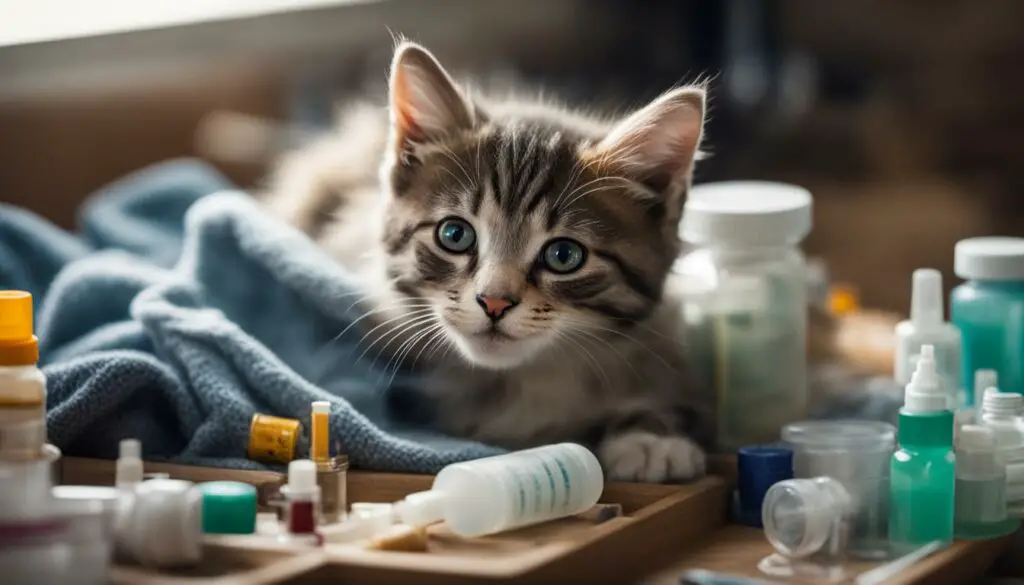
Table: Benefits vs. Risks of Vaccinating Kittens
| Benefits | Risks |
|---|---|
| Vaccinations protect against serious diseases | Minor side effects may occur |
| Prevents the spread of contagious diseases | Very rare risk of severe allergic reactions |
| Improves overall health and well-being | Temporary fatigue or discomfort after shots |
| Reduces the need for expensive medical treatments | Localized swelling or tenderness at injection site |
As with any medical decision, it’s important to weigh the pros and cons. In the case of vaccinations for kittens, the benefits significantly outweigh the risks. Vaccinating your kitten is a responsible choice that can protect their future health and contribute to the well-being of the entire feline community.
Discomfort and Lethargy After Vaccines in Kittens
After receiving vaccines, it is common for kittens to exhibit certain discomfort and lethargy. This can include tenderness or soreness at the injection site, reduced appetite, and mild fever. These symptoms are typically mild and should resolve within a day or two. However, if the symptoms persist or worsen, it is important to contact your veterinarian for further guidance.
It is important to remember that the discomfort and lethargy experienced by kittens after vaccines are normal and expected reactions. The immune system is being activated by the vaccines, which can cause these temporary side effects. Rest assured that these symptoms are typically mild and do not indicate any serious complications. Providing your kitten with a calm and comfortable environment, along with plenty of rest and hydration, will help them recover more quickly.
While these symptoms may be concerning, it is crucial to remember the importance of vaccinations in protecting your kitten’s long-term health. Vaccines are crucial in preventing a range of serious and contagious diseases. The mild discomfort and lethargy experienced after vaccines are minimal compared to the potential risks associated with these diseases. If you have any concerns or questions about your kitten’s post-vaccination symptoms, do not hesitate to reach out to your veterinarian for guidance and reassurance.
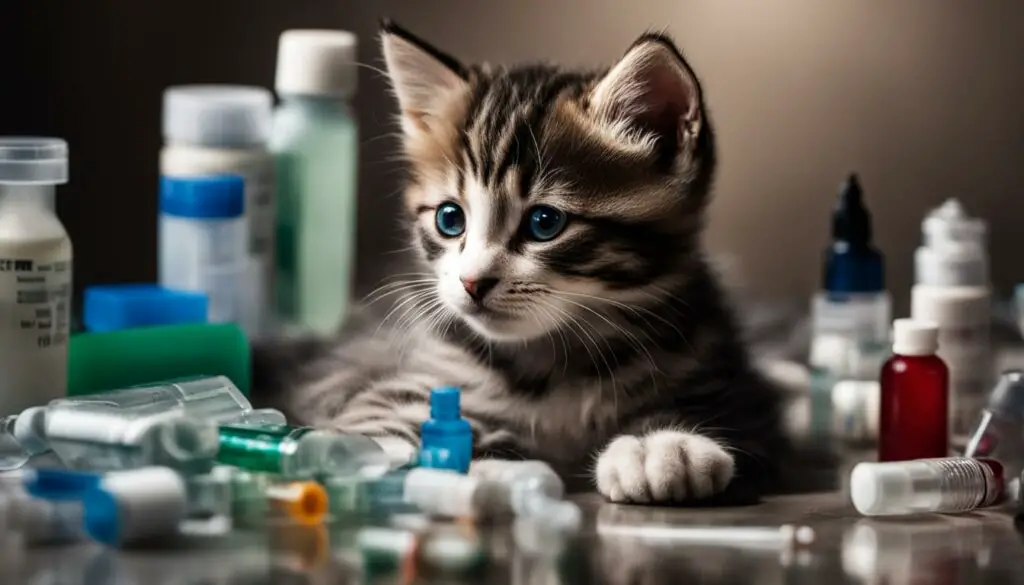
Remember to monitor your kitten closely after vaccinations and observe any unusual or severe reactions. While serious reactions are rare, it is essential to seek immediate veterinary attention if your kitten experiences symptoms such as facial swelling, difficulty breathing, hives, vomiting, diarrhea, or collapse. Your veterinarian will be able to provide the necessary care and guidance to ensure the well-being of your kitten.
Section 9: Serious Reactions to Vaccines in Kittens
While serious reactions to vaccines in kittens are rare, it is important to be aware of the signs and seek immediate veterinary attention if they occur. These reactions can be severe and require prompt medical intervention to ensure the well-being of your kitten. Keep a close eye on your kitten after vaccinations and look out for the following symptoms:
- Facial swelling: If you notice any swelling around your kitten’s face, particularly the eyes, lips, or muzzle, it could indicate an allergic reaction.
- Difficulty breathing: Labored breathing, wheezing, or gasping for air are red flags that should never be ignored. Seek veterinary help immediately.
- Hives: Raised, itchy bumps on the skin, often accompanied by redness or swelling, can be a sign of an allergic reaction.
- Vomiting and diarrhea: Persistent vomiting and diarrhea can indicate a severe adverse reaction to the vaccine.
- Collapse: If your kitten suddenly collapses or loses consciousness, it is a medical emergency that requires immediate attention.
Remember, if you observe any of these symptoms in your kitten after vaccinations, it is crucial to contact your veterinarian or an emergency veterinary clinic right away. They will be able to provide the necessary medical care and support to address the severe reactions and ensure the best possible outcome for your furry friend.
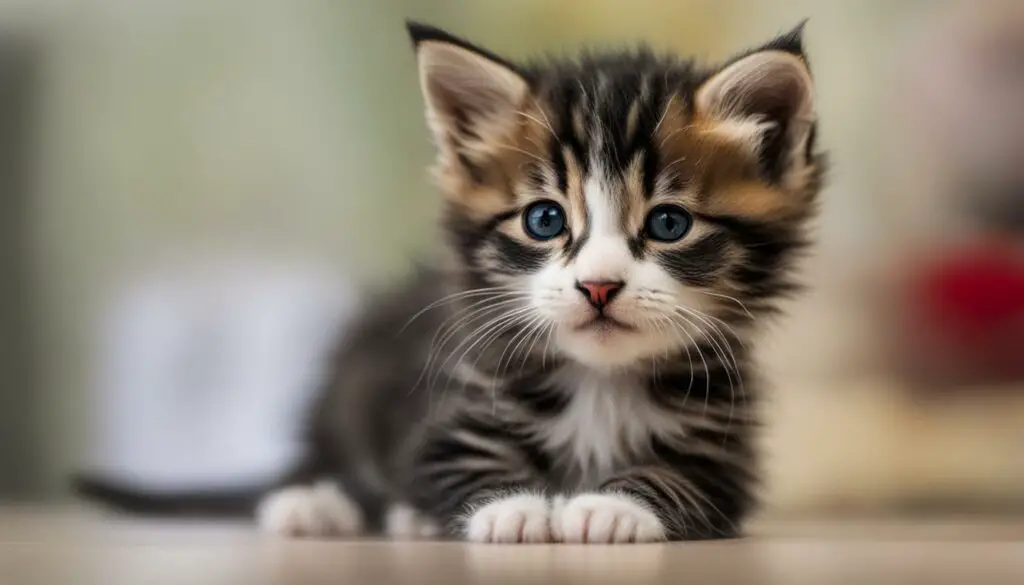
Precautions for Kittens with Severe Vaccine Reactions
When it comes to kittens with severe vaccine reactions, extra precautions may be necessary to ensure their health and well-being. These precautions can help minimize the risk of adverse reactions and provide the necessary care for your furry friend.
One precautionary measure is spacing out and separating vaccines. By allowing more time between vaccinations, your kitten’s immune system has a chance to recover and respond appropriately. This can help reduce the likelihood of severe reactions and give your kitten’s body time to adjust.
In some cases, your veterinarian may recommend administering medications such as Benadryl before vaccinations. These medications can help reduce the risk of allergic reactions and provide additional protection for your kitten. It’s important to follow your veterinarian’s instructions carefully and never give any medication without their guidance.
In certain situations, your kitten may need to be closely monitored in the veterinary hospital after receiving vaccines. This allows the veterinary team to quickly respond to any potential reactions and provide immediate care if necessary. The hospital environment ensures that your kitten is in a controlled setting with access to specialized care.
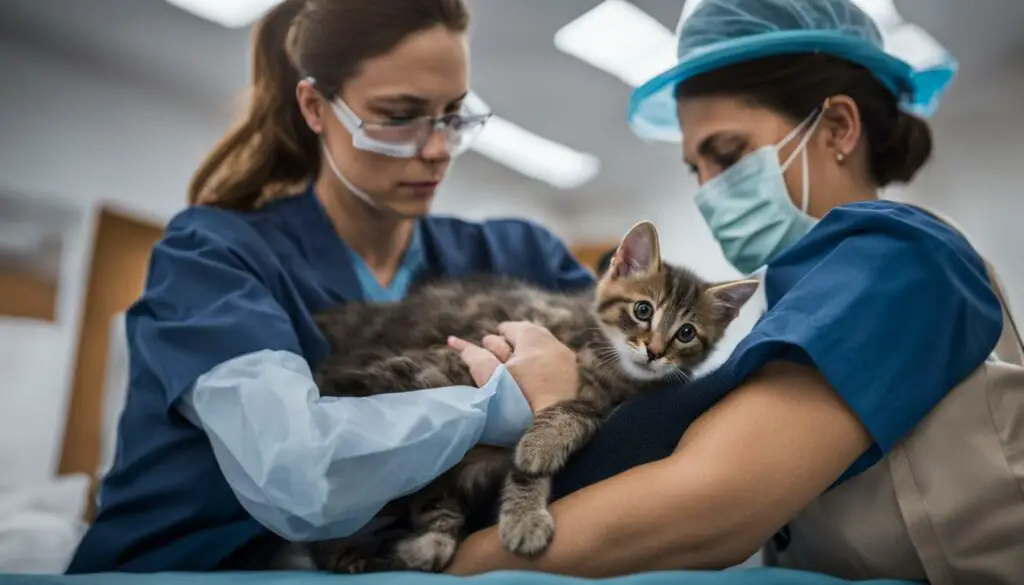
Lump Formation After Vaccines in Kittens
After receiving vaccines, it is not uncommon for kittens to develop small, firm bumps at the site of injection. These lumps, also known as injection site reactions, are a normal part of the inflammatory response triggered by the vaccines. While they may cause concern for some pet owners, it’s important to understand that these lumps are generally harmless and often resolve on their own without any intervention.
Most injection site reactions appear within a few days after vaccination and gradually diminish over time. However, if a lump persists for more than three months or shows signs of infection, such as redness, warmth, tenderness, or discharge, it should be examined by a veterinarian. In rare cases, a lump may indicate an abscess or another underlying issue that requires medical attention. It’s always better to err on the side of caution and have a professional evaluate any persistent or concerning lumps.
While injection site reactions are generally benign, it’s essential to differentiate them from more serious side effects or adverse reactions. Monitor your kitten for any additional symptoms such as severe swelling, difficulty breathing, hives, vomiting, diarrhea, or collapse. If any of these symptoms occur, it’s crucial to seek immediate veterinary care, as they may indicate a severe allergic reaction or another serious condition.
| Severity Level | Description |
|---|---|
| Mild: | Small, firm bump at the injection site. Resolves within a few days. |
| Moderate: | Enlarged area with redness and swelling. Resolves within a week. |
| Severe: | Large, painful lump with persistent redness and swelling. May require veterinary attention. |
Remember, if you have any concerns about lump formation or any other post-vaccination reactions in your kitten, always consult with your veterinarian. They can provide the appropriate guidance and ensure your kitten’s health and well-being.
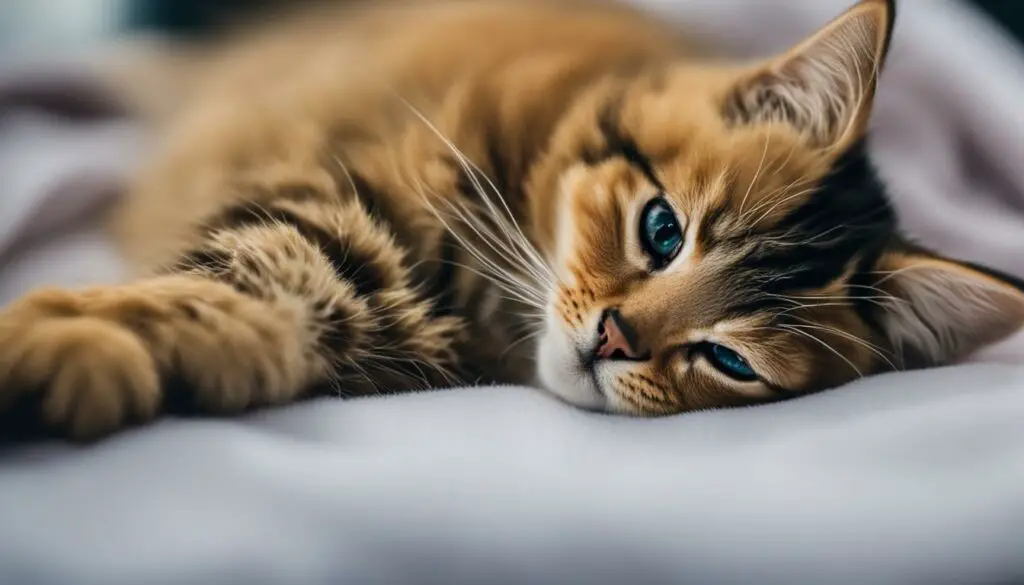
Maintaining Vaccine Reaction History for Kittens
As a responsible pet owner, it is crucial to maintain an accurate and up-to-date vaccine reaction history for your kitten. This information plays a vital role in guiding the vaccination protocol and minimizing the risk of adverse reactions. By sharing your kitten’s previous vaccine reactions with your veterinary team, they can make informed decisions about the timing and administration of future vaccinations.
When maintaining your kitten’s vaccine reaction history, include details such as the type of vaccine administered, the date of vaccination, and any observable reactions or side effects. This information helps veterinarians identify patterns and determine the best course of action for your kitten’s health. Keep a record of all vaccinations received, including booster shots, to ensure comprehensive protection against diseases.
In addition to maintaining your kitten’s vaccine reaction history, it is also essential to update this information if you change veterinarians or move to a different location. By providing accurate information to your new veterinary team, they can continue to monitor your kitten’s health and make informed decisions regarding their vaccination schedule.
Why Is Maintaining Vaccine Reaction History Important?
Maintaining a comprehensive vaccine reaction history for your kitten is important for several reasons. Firstly, it allows veterinarians to identify any potential patterns or trends in your kitten’s reactions to specific vaccines. This information can help guide future vaccination protocols and minimize the risk of adverse reactions.
Secondly, maintaining a vaccine reaction history ensures that your kitten receives the appropriate vaccines and avoids unnecessary repetition. By documenting which vaccines your kitten has already received, your veterinary team can tailor their vaccination schedule to provide optimal protection without over-vaccination.
Lastly, a vaccine reaction history can be crucial in the event of a medical emergency or if your kitten experiences an adverse reaction. By having a comprehensive record of your kitten’s previous reactions, your veterinarian can quickly assess the situation and provide the necessary treatment.
Overall, maintaining a detailed and up-to-date vaccine reaction history for your kitten is an essential step in ensuring their health and well-being. By working closely with your veterinary team and providing accurate information, you can help protect your kitten from potential adverse reactions and maximize the benefits of vaccinations.
Importance of Vaccinations for Kittens
As a responsible pet owner, it is crucial to understand the importance of vaccinations for kittens. Vaccines play a vital role in protecting kittens from serious and contagious diseases that can be life-threatening. By immunizing your kitten, you are providing them with the best defense against potential health risks.
Vaccinations help to stimulate your kitten’s immune system and prepare it to fight off specific infectious organisms. They create a shield of immunity that safeguards your kitten from harmful diseases such as feline panleukopenia, calicivirus, and rhinotracheitis. These diseases can cause severe illness and even death in unvaccinated kittens.
By ensuring your kitten receives the necessary vaccines at the recommended ages, you are not only protecting their individual health but also contributing to the overall well-being of the feline community. Vaccinations help establish herd immunity, which reduces the spread of diseases and protects vulnerable animals who cannot be vaccinated due to medical reasons.
It is important to work closely with your veterinarian to develop a personalized vaccination schedule for your kitten. Your veterinarian will consider various factors such as your kitten’s age, health status, and the prevalence of diseases in your area. By following the recommended vaccination protocols, you are providing your kitten with the best chance of a healthy and happy life.
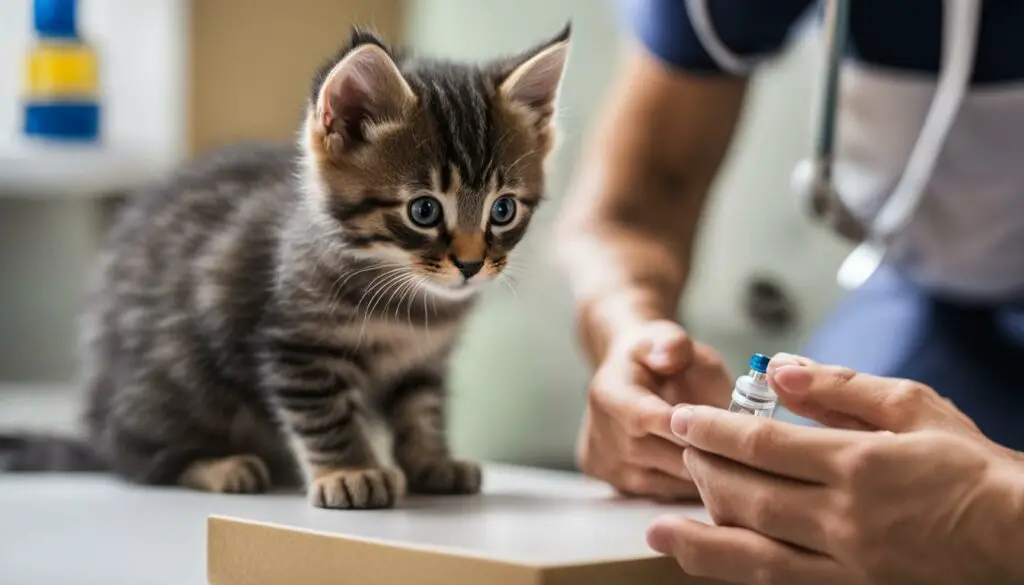
Table: Common Vaccines for Kittens
| Vaccine | Disease(s) Prevented | Recommended Age |
|---|---|---|
| Feline Panleukopenia (FVRCP) | Feline panleukopenia, calicivirus, rhinotracheitis | 6-8 weeks |
| Rabies | Rabies | 12-16 weeks |
| Feline Leukemia (FeLV) | Feline leukemia virus | 8-12 weeks |
Remember, vaccines are an essential part of responsible pet ownership. They protect your kitten and help prevent the spread of diseases in the feline population. By staying up to date with your kitten’s vaccinations, you are ensuring their long-term health and well-being. Consult with your veterinarian to create a vaccination plan tailored to your kitten’s specific needs.
Conclusion
It is completely normal for kittens to feel lethargic and tired after receiving their vaccinations. This lethargy is a common reaction to the vaccines stimulating their immune system to fight off potential diseases. Symptoms such as mild fever, upset stomach, and soreness can make kittens feel exhausted and less energetic. However, there are steps you can take to help your kitten feel better after getting shots.
Creating a quiet and comfortable resting area for your kitten away from noise and commotion is essential. It is also important to ensure they have access to fresh water to prevent dehydration. Monitoring their appetite and encouraging them to eat at the right time helps maintain their energy levels. Additionally, avoiding excessive play or strenuous activity can prevent further discomfort at the injection site.
If your kitten’s temperature exceeds 103 degrees Fahrenheit, it is crucial to contact your veterinarian for guidance. While most side effects of cat vaccines are mild and transient, severe allergic reactions are rare but require immediate veterinary attention. It is vital to be aware of any symptoms such as difficulty breathing, vomiting, excessive drooling, or diarrhea, and seek professional help if necessary.
Despite the possibility of side effects, it is important to continue vaccinating your kitten to protect them from potential diseases. Vaccinations are crucial for their long-term health, and the benefits far outweigh the risks. By prioritizing your kitten’s well-being and taking the necessary precautions, you can ensure they grow up healthy and protected.
FAQ
Why do kittens feel lethargic after getting shots?
Kittens may feel lethargic after shots because the vaccines stimulate their immune system, causing their body to use more energy. This can make them feel tired and sleepy.
How long does the lethargy last in kittens after vaccinations?
The lethargy after vaccinations is usually more pronounced in kittens getting their first doses and can last up to a day or two. However, it should resolve within that time frame.
What are the common side effects of cat vaccines?
Common side effects of cat vaccines include sleepiness, mild stomach upset, localized swelling at the injection site, cold-like symptoms such as runny nose and coughing, and in rare cases, anaphylaxis.
How can I make my kitten feel better after getting shots?
To help your kitten feel better after getting shots, provide a quiet and comfortable place for them to rest, ensure they have access to fresh water, monitor their appetite, avoid excessive play or strenuous activity, and check their temperature.
How can I prevent my kitten from having an allergic reaction to vaccines?
Your veterinarian may suggest administering the shots at different times or spacing them out to minimize the risk of allergic reactions. Depending on your kitten’s health, certain vaccines may be temporarily skipped.
How long do cat vaccine side effects last?
Minor side effects of cat vaccines typically last for about 24 to 48 hours. However, more severe side effects may last longer, and it is advisable to consult your veterinarian if your kitten experiences persistent discomfort or side effects.
Should I continue vaccinating my kitten despite side effects?
Yes, it is important to continue vaccinating your kitten despite the possibility of side effects. Vaccinations are essential for their long-term health and protection against potential diseases.
Why do kittens experience discomfort and lethargy after vaccines?
Kittens may experience discomfort and lethargy after vaccines due to the immune response and inflammation at the injection site. This is a normal reaction as their body builds immunity.
What should I do if my kitten has a severe reaction to vaccines?
If your kitten exhibits symptoms of a severe allergic reaction, such as difficulty breathing, vomiting, or collapse, it is important to seek immediate veterinary attention. Contact your veterinarian or an emergency veterinary clinic right away.
What precautions should I take for kittens with severe vaccine reactions?
Depending on the severity of the reactions, your veterinarian may recommend spacing out and separating vaccines, administering medications before vaccinations, or monitoring the kitten in the veterinary hospital after vaccines are given.
Is it normal for kittens to develop lumps at the site of vaccination?
Yes, it is normal for kittens to develop small, firm bumps at the site of vaccination. These lumps are a part of the inflammatory response and typically resolve on their own without intervention.
Why is it important to maintain vaccine reaction history for kittens?
Maintaining your kitten’s vaccine reaction history is crucial for future vaccinations. It helps guide the vaccination protocol to minimize the risk of adverse reactions and ensures the safety of future vaccinations.
Why are vaccinations important for kittens?
Vaccinations are vital for protecting kittens from serious and contagious diseases. Despite the small risk of side effects, the benefits of vaccinations far outweigh the potential risks.